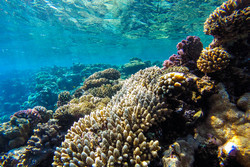Mucus and microbes
Mucus is important to the interaction of animals with their environments. The substance also plays a role in animal immunity, both as a defensive layer and as a nutrient medium for protective microorganisms. The EU-funded COSMIC (Coral surface microlayer: production and dynamics of mucus-associated microbial communities) project examined such interactions. In order to study the topic at a fundamental level, the study focused on very simple animals. Corals biologically depend on mucus, while the secretions also support communities of symbiotic microorganisms. The goal of the five-part study was to study mucus' changing chemical composition and the resulting effects on the microbial communities. The same chemical approach was to reveal evolutionary relationships among corals. Coral species' surface mucosal layers differ physically and chemically. The mucus layer of a single coral individual can also vary considerably, probably indicating superficial variation in metabolic processes. Specific bacteria and related organisms exploit the variation in different ways. Mucosal compositional variation illustrates evolutionary relationships among corals. Coral groups can be separated according to the main types of sugars found in their respective mucus. Results showed substantial differences in factors affecting distribution of bacteria and archaea. Archaea is an ancient group of simple microbes, superficially resembling bacteria, but quite different chemically. Habitat alone determined composition of archaeal communities, while bacterial communities responded to host coral species, location, and spatial distance as well. Researchers thus concluded that the two types of microbe differ in their degree of community turnover on reefs, and regarding host-specificity. Hence, the bacteria and archaea represent distinct ecological guilds having separate associations with corals. Sulfur availability in seawater also mediates the exchange between microbes and corals. Various microbial communities contribute to coral health via cyclical changes. Specifically, corals shed layers of hardened, aged mucus; such response maintains beneficial microbes while eliminating potential pathogens. Thus mucosal microbes also contribute to the over-all health and resilience of coral reefs. The COSMIC project contributed new understanding of the relationships between corals and microbes. The work reflects the importance of mucosal microbes to all animals, and may potentially lead to applications in human immunity and nutrition.







